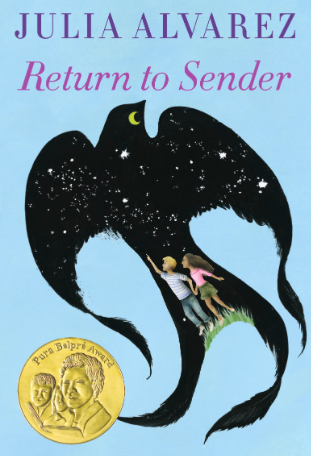Literature in Context: A Community-Based Education Guide to Julia Alvarez’s Return to Sender

Literature in Context: A Community-Based Education Guide to Julia Alvarez’s Return to Sender

Download the Learning Map, which links this book to local opportunities for community-based learning.
Tyler has grown up in rural Vermont on his family’s dairy farm – like many New England fairy farms, the Paquette family has been farming their land for generations. The farm struggles with the same challenges that every small New England dairy encounters, but the real challenge comes when Tyler’s father is seriously injured in a tractor accident and is unable to work. Without the help of his late grandfather to run the farm, Tyler’s family finds itself in a difficult position: hire migrant workers to keep the farm running, or lose the farm – and their family history with it.
The Paquettes find three men to come work and live on the farm, hoping that paying for labor will be worth it if it means they’ll get to keep the farm. It comes as a surprise when the three men – all brothers – bring three young girls with them, too. Readers learn early on that the family are undocumented immigrants from Mexico, and that the girls (Mari, Luby, and Ofie) have come to the farm because their mother is missing. Having travelled back to her hometown in Mexico and not returned, the girls have been forced to move on without knowledge of their mother’s whereabouts.
Throughout the story, readers are challenged to think critically about immigration policy, human rights, empathy, and ethics as the story evolves. The community in which the Paquettes live does not welcome the new workers, and Tyler is singled out at school for his family’s decision to hire Mexicans. Mari, the oldest of the girls, learns more and more about the fate that her mother may have met at the hands of the “coyotes,” the human smugglers trusted with returning her to the United States to rejoin her family. Both families are challenged when ICE (Immigration and Customs Enforcement) agents find their way to the farm.
Julia Alvarez’s Return to Sender was published in 2009, but highlights themes that remain incredibly relevant today. The story calls upon readers to have empathy for all characters, and shows readers how to see undocumented immigrants as humans – just as human as they themselves are. Additionally, the story sheds light on the complex relationship that our country has with immigration. Despite national policy that dictates the undocumented immigrants in the story be arrested, detained, and sent back to Mexico, the role that they and many others like them play within the agricultural industry is essential. Farms of all sizes across the country rely on labor from migrant workers, including some who are undocumented immigrants. Without these workers, many farms – just like the Paquettes’ – would not stay afloat. These ethical dilemmas, found at the heart of the story, guide readers to develop their own way of understanding this complex and important topic. Use our accompanying guide to explore these themes with readers, then use resources from the community to get involved and continue to learn.
Robin Morgan Huntley, Community-Based Education Correspondent
 Robin joined Hilltown Families in 2011 as an intern and has remained with the organization ever since, first volunteering as a community-based education correspondent until 2016 and now as a contributing writer with two monthly columns. Robin is a graduate of Hampshire College and Antioch University New England, where she studied place- and community-based education. She lives on the banks of the Sheepscot River in Maine, where she and her husband are working to start a small farm. Robin teaches at Juniper Hill School for Place-Based Education and is the founder of our first affiliate community-based education network, Dirigo Learning.
Robin joined Hilltown Families in 2011 as an intern and has remained with the organization ever since, first volunteering as a community-based education correspondent until 2016 and now as a contributing writer with two monthly columns. Robin is a graduate of Hampshire College and Antioch University New England, where she studied place- and community-based education. She lives on the banks of the Sheepscot River in Maine, where she and her husband are working to start a small farm. Robin teaches at Juniper Hill School for Place-Based Education and is the founder of our first affiliate community-based education network, Dirigo Learning.
 Hilltown Families
Hilltown Families 




























